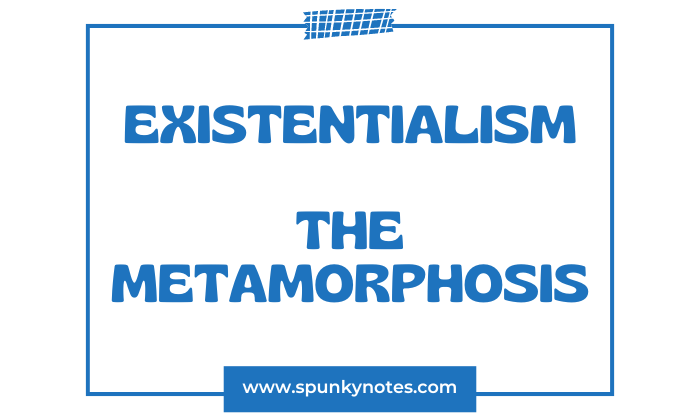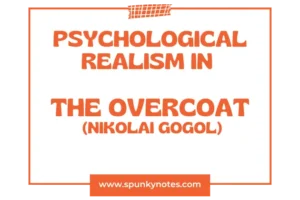
Estimated Reading Time: 5 min

Q. Trace out existentialism in the novel The Metamorphosis by Franz Kafka.
Franz Kafka‘s novella “The Metamorphosis” is a key work in existential literature. It deals with themes like absurdity, alienation, identity, and the search for meaning in an arbitrary and indifferent world.
The Metamorphosis was first published in 1915. It tells the story of Gregor Samsa, a traveling salesman who wakes up one morning to find himself inexplicably transformed into a giant insect.
This bizarre and unsettling transformation triggers a series of events that reveal the true nature of Gregor’s relationships with his family and his sense of identity.
As Gregor struggles to adapt to his new form, he faces alienation, isolation, and a profound existential crisis. His family, initially shocked and repulsed, gradually becomes indifferent and hostile, leading to Gregor’s ultimate demise.
Absurdity and Arbitrary Existence
The story begins with Gregor Samsa waking up as a giant insect. This bizarre event shows the absurdity of life. Existentialism suggests that life has no inherent meaning and that individuals must navigate a world without a clear purpose.
Gregor’s transformation, which lacks any logical explanation, highlights how unpredictable and irrational life can be. Kafka’s choice not to explain Gregor’s condition mirrors the often inexplicable nature of human experiences and suffering.
Alienation and Isolation
After his transformation, Gregor experiences deep alienation and isolation. His family’s reaction of fear and disgust signifies his estrangement from those he once held dear.
Alienation is central in existentialism, where individuals often feel disconnected from others and society. Gregor’s new form isolates him from the human world, making him a stranger in his own home.
Kafka uses Gregor’s isolation to show the impact of societal rejection and how quickly people can be cast aside when they no longer fit the expected roles. This isolation forces Gregor into a lonely existence, reflecting the struggles many face in their quest for connection and belonging.
Loss of Identity and Autonomy
Gregor’s transformation results in the loss of his human identity and societal roles, such as being a son, brother, and provider. This loss represents an existential crisis of identity, where one’s sense of self is stripped away, leading to profound questioning of one’s purpose.
Existentialism asserts that individuals must create their meaning in a world that offers no clear directives. Gregor’s condition forces him to confront his existence more directly, questioning the value of his previous commitments and sacrifices.
His family’s growing indifference and hostility strip him further of his former identity, pushing him to navigate his existence with limited autonomy. This search for self-identity and autonomy is central to human experience, emphasizing the struggle to define oneself amid external pressures and internal doubts.
Search for Meaning
Throughout the story, Gregor’s struggle to find purpose in his altered state reflects his existential quest for meaning. Despite his physical limitations, he retains human emotions and desires, clinging to remnants of his past life.
His attachment to objects like the picture of the woman in fur and his attempts to listen to his sister play the violin shows his ongoing search for meaning and connection. Existentialism highlights the importance of creating one’s meaning in an indifferent universe.
Gregor’s efforts to find purpose, even in his insect form, demonstrate the resilience of the human spirit in seeking significance, despite overwhelming absurdity.
Choice and Responsibility
The choices made by Gregor and his family are central to the story and reflect existential themes of freedom and responsibility. Each character’s response to Gregor’s condition shows their approach to confronting or avoiding the challenges it presents.
Existentialism emphasizes that individuals are free to make their own choices but must also bear responsibility for those choices. Gregor’s family, by choosing to isolate and eventually rid themselves of him, shows their inability to cope with his condition and its demands.
This avoidance of responsibility highlights the moral and ethical dilemmas faced by individuals when confronted with difficult circumstances.
Confrontation with Death
Gregor’s death at the end of the novella is portrayed as an inevitable conclusion to his suffering. Existentialism often focuses on mortality, suggesting that awareness of death is essential to understanding life’s significance.
Gregor’s passing brings relief to his family, indicating that his death has freed them from the burden of his care. This resolution reflects the existential view that facing death is crucial to understanding life. Gregor’s demise underscores the belief in the transient nature of human existence and the importance of finding meaning despite mortality.
Conclusion
Franz Kafka’s “The Metamorphosis” is a clear reflection of existentialist themes. The story shows the absurdity of life through Gregor Samsa’s sudden transformation into an insect, which happens without any reason. This highlights the unpredictable and irrational aspects of existence.
Gregor’s alienation after his transformation underscores the existential theme of isolation. His family’s fear and rejection deepen his sense of loneliness, showing how society can easily discard those who do not conform to its norms.
The loss of Gregor’s identity and autonomy, as he is no longer able to fulfill his roles as a son and provider, illustrates an existential crisis. He is forced to confront his existence and question the purpose of his previous life.
Gregor’s struggle to find meaning in his new condition reflects the existential quest for purpose in an indifferent world. Despite his physical limitations, he continues to seek significance and connection.
Finally, Gregor’s death and his family’s relief emphasize the existential focus on mortality and the search for meaning despite the inevitability of death.


